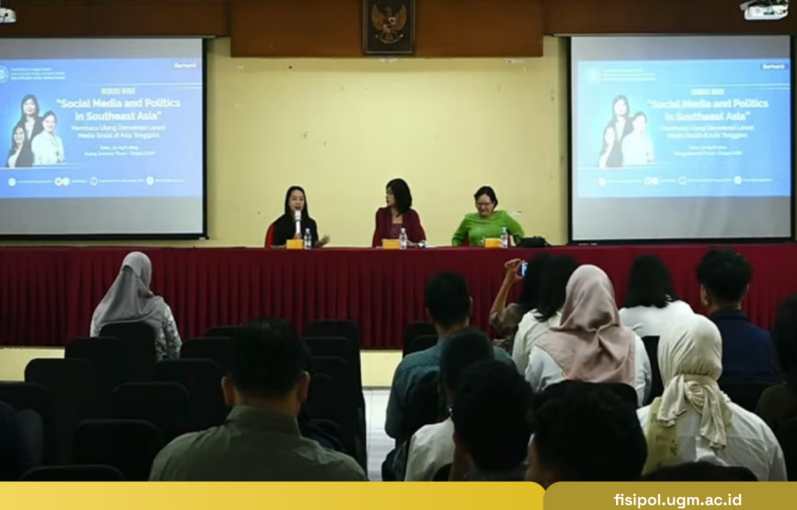
Yogyakarta, April 30th 2025─Department of Communication Studies of FISIPOL UGM, held a book review event Social Media and Politics in Southeast Asia. The event invited the speaker and author of the book, Prof. Merlyna Lim (Canada Research Chairs in Digital Media & Global Community Network); the discussant, Prof. Dr. Phil. Hermin Indah Wahyuni, S.I.P., M.Si. (Lecturer of Communication Studies of UGM and Professor of Communication Systems); and moderated by Mashita Pitaloka Fandia Purwaningtyas S.I.P., M.A. (Lecturer of Communication Studies of UGM). This event was held offline at the Seminar Timur Room and broadcast live on the YouTube channel of the Department of Communication Studies UGM.
The book Social Media and Politics in Southeast Asia re-examines democracy in social media in Southeast Asia. “This book tries to question big political notions and frameworks that I think are a bit oversimplified. So most people writing about disinformation, digital propaganda, etc., ‘Oh it’s because of social media,’ they said. Meanwhile, there are many of the same thinkers who were very utopian fifteen years ago,” Merlyna said.
Broadly speaking, the book offers three major arguments. Firstly, there is a mistake in viewing the concept of a network society that assumes that networks are egalitarian, but instead more and more people with power are becoming major actors. Secondly, digital technologies are not fully democratic as over time control and power become centralized. Third, design plays a crucial role in that social media is designed for “tap capitalism” – what matters is not the users, but the advertisers or advertisers based on algorithms. In addition, the context of Southeast Asian countries is an interesting study because digital media users in Southeast Asia are the highest compared to other regions. However, digital media users are not proportional to political participation as citizens who claim their rights, but shift to consumers who participate in marketing so that the discourse formed is affection-based, instead of rational-based discourse.
The book challenges popular perspectives on the role of the media, which is considered capable of moderating the democratization process. “I think Prof. Lim from the beginning wanted to say that we are questioning again. Actually, social media is not inherently democratic. So what is happening is euphoria, so we are like a paradox. So from the beginning as a tool, it provides a platform for openness, but on the same side I think this nano-nano feeling is felt,” said Hermin.
